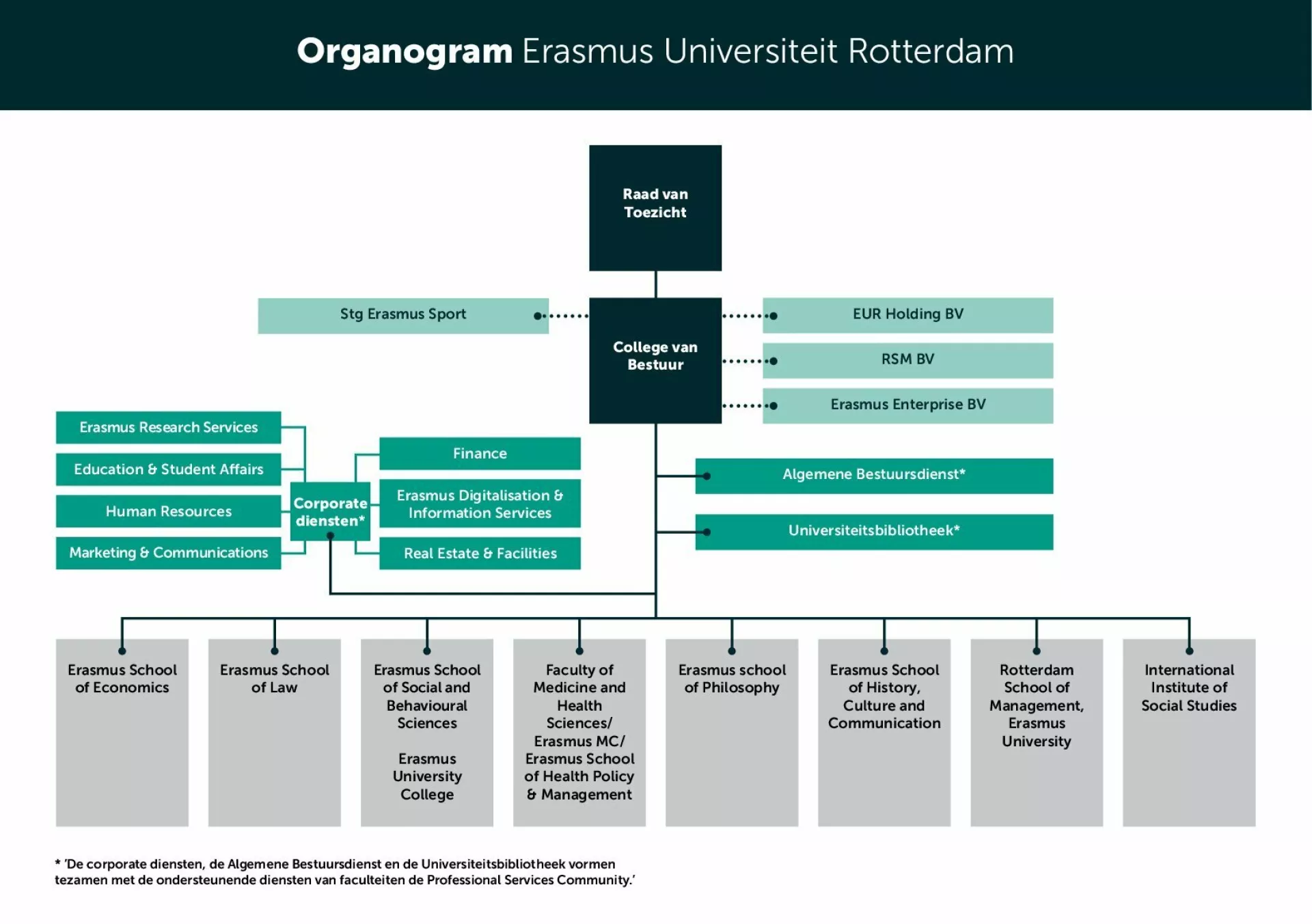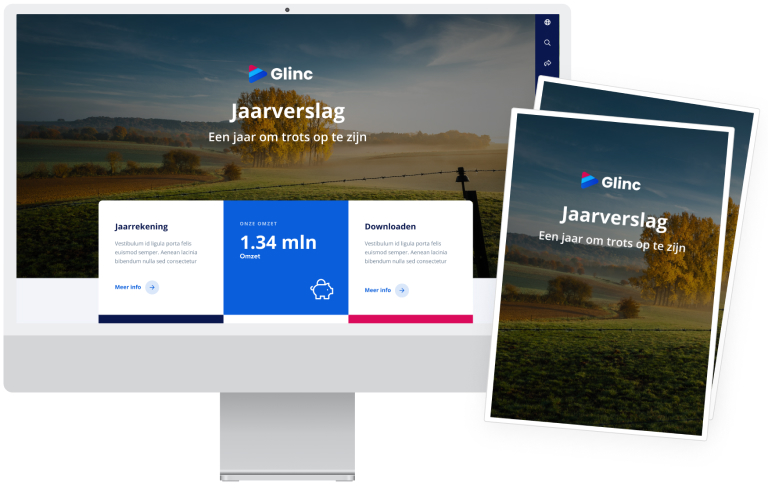
Governance and participation bodies

Erasmus University Rotterdam (EUR) has been a legal entity under public law since 1 February 1973, established by law and located in Rotterdam.
Higher Education and Research Act (WHW) and the Code of Good Governance for Universities
The Higher Education and Research Act (WHW) sets out the rules and guidelines of the Ministry of OC&W that form the basis for the governance, the obligations and responsibilities of the universities. The Higher Education and Research Act lays the basis for, among other things, the funding method, staffing policy, accreditation of study programmes, the programmes being offered and collaborations.
The EUR’s governance is designed in accordance with the Code of Good Governance for Universities, drawn up by Universities of the Netherlands (UNL). Under this code, the Executive Board and the Supervisory Board work together on the basis of a transparent form of governance and supervision with good engagement of participation bodies.
This is done with a particular focus on:
- The responsibility of the various governance levels; in addition to the Supervisory Board and the Executive Board, deans and Faculty Boards are also held accountable for their governance role, as they have significant responsibilities within the university both under law and in practice.
- The importance of an open culture and a safe work and study environment. The role and powers of participation bodies.
- The effective design of the governance of cooperative arrangements between universities and other universities and between universities and government/business.
This appendix sets out an overview of the roles and responsibilities of the various governance levels at EUR: the Executive Board, the Supervisory Board and the deans. In addition, the role of the participation bodies is described in detail. In that connection, the EUR Central Election Office is also important.
One of the provisions of the Higher Education and Research Act (WHW) and the Code of Good Governance for Universities is that the members of the Supervisory Board and Executive Board are transparent about their ancillary positions. This appendix therefore also contains an overview of the ancillary positions held in the 2023 reporting year.
EUR has various diligent procedures to ensure a safe work and study climate; you can read more about those procedures elsewhere in this annual report. In that connection, we describe the EUR complaints policy in this appendix.
Supervisory Board
Roles and responsibilities
In accordance with the WHW (Section 9.6 to 9.9), the Supervisory Board supervises the Executive Board’s administration and management of the university and provides solicited and unsolicited advice to the Executive Board. In any case, the Supervisory Board has the task of approving the strategic plan, the budget, the annual report, the financial statements and the university’s Administration and Management Regulations. The Supervisory Board is accountable to the Minister of OC&W, who appoints the members of the Supervisory Board.
Members of the Supervisory Board in 2022, ancillary positions and term of appointment
Prof. J.W. (Jaap) Winter, Chair of the Supervisory Board, Partner at the consultancy firm Phyleon Leadership & Governance
- Professor of Corporate Law Governance & Behaviour at VU University Amsterdam
- Professor of International Business Law at the University of Amsterdam
- Chair of the Supervisory Board of Royal Schiphol Group N.V.
- Member of the Board of Stichting Continuïteit ASR Nederland
Term of office 1 June 2020 to 31 May 2024.
Prof. Ir. C.J. (Hans) van Duijn - Vice Chair of the Supervisory Board and Chair of the Quality Committee up to 1 August 2023, emeritus professor/Rector Magnificus at TU Eindhoven and management consultant
- Chair of the Standing Committee on Large-Scale Scientific Infrastructure (Permanente Commissie Grootschalige Wetenschappelijke Infrastructuur) (NWO)
- Chair of the Sector Plan Committee for Science and Technology (sectorplancommissie Bèta Techniek)
- Chair of the JMBC Board (research school for fluid mechanics) - Dutch delegate to ESFRI (European Strategy Forum for Research Infrastructure)
- Member of Royal Holland Society of Sciences and Humanities (KHMW)
Term of office 1 August 2015 to 31 July 2023.
Dr R. (Rahul) Vas-Bhat, Chair of the Audit Committee and Supervisory Board member, Chief Financial Officer of Caldic B.V.
- No ancillary positions in 2023
- Chair of the Financial Expertise Centre (FEC)
- Member of Assessment Advisory Committee Nationaal Groeifonds Executive Board Member of Pierson fund
- Member of Supervisory Board of Netspar
- Chair of Interdepartmental Climate Policy Research (from September 2022)
- Columnist at Het Financieel Dagblad (from October 2022)
Term of office 1 March 2022 to 28 February 2026.
Drs. L.B.J. (Laura) van Geest, member of the Supervisory Board and member of the Audit Committee, Chair of the Executive Board of the Dutch Authority for the Financial Markets (AFM)
Term of office 1 June 2020 to 31 May 2024.
Prof. (Ellen) Giebels, member of the Supervisory Board and member of the Quality Committee until 1 August 2023, Chair of the Quality Committee and Vice-Chair of the Supervisory Board from 1 August 2023, Full professor of Social Psychology of Conflict and Safety, University of Twente
- Member of the Strategic Advisory Council TNO Defence and Security
- Member of the Advisory Board of LOWI (on the recommendation of the NWO)
- Member of the NeurolabNL task force - Safety and Security Theme
- Guest lecturer Police Academy
Term of office 1 June 2020 to 31 May 2024.
Prof. (Elmer) Sterken, member of the Supervisory Board and member of the Quality Committee, Professor of Monetary Economics, University of Groningen
- Chair of the Supervisory Board, University of Humanistic Studies
- Member of the University Council, University of Tartu
- Member of the Supervisory Board, Groninger Museum
- Member of the Central Planning Committee CPB
Term of office 1 August 2023 to 31 July 2027.
Members of the Executive Board: portfolios, ancillary positions and term of appointment
The members of the Executive Board are appointed by the Supervisory Board and render themselves account to the Supervisory Board for the policy and management they have conducted.
Chair - Prof. H. (Ed) Brinksma
The Chair is responsible for general administrative matters within the university. The Chair’s portfolio includes strategic policy, regional, national and international collaboration and contacts with the municipality of Rotterdam and the Ministry of Education, Culture and Science (OC&W).
Ancillary positions in 2023:
- Professor of Computer Science, University of Twente
- Member of the Supervisory Board, Utrecht University of Applied Sciences, from 1 October 2022
Term of office 1 September 2020 - 1 September 2024.
Rector Magnificus – Prof. A.L. (Annelien) Bredenoord
The Rector Magnificus is responsible for the portfolio of education (quality), research and valorisation, as well as the academic staffing policy, student policy and the provision of public information about science.
Ancillary positions in 2023:
- Group Chair of the Senate of the Dutch Parliament, D66 (until 13 June 2023)
- Member of the High Level Expert Group Horizon Europe (from 1 December 2023)
Term of office 1 October 2021- 1 October 2025.
Vice-Chair - Dr E.M.A (Ellen) van Schoten RA
The Vice-Chair manages the finance, professional services, real estate, sustainability and IT portfolio and is responsible for the continued development of operational management with a view to EUR’s strategic and other objectives.
Ancillary positions in 2023:
- Member of the Audit Committee, Ministry of Agriculture, Nature and Food Quality
- Chair of the Escience Center
- Member of the Audit Committee of the Statistics Office of the Netherlands (CBS)
- Member of the Supervisory Board of Rotterdam Philharmonic Orchestra (from 20 December 2023)
Term of office 1 January 2021 - 1 January 2025.
Deans
The deans bear responsibility for the quality of the education and research at their faculty. Two changes took place in 2023, at Rotterdam School of Management (RSM) and the International Institute of Social Studies (ISS).
- Prof. P.J.F. (Patrick) Groenen), Dean of Erasmus School of Economics (ESE)
- Prof. H. (Harriët) Schelhaas, LLM, Dean of the Erasmus School of Law (ESL)
- Prof. V.J.J.M. (Victor) Bekkers, Dean of Erasmus School of Social and Behavioural Science (ESSB)
- Prof. M. (Martine) van Selm, Dean of Erasmus School of History, Culture and Communication (ESHCC)
- Prof. H.A.E. (Hub) Zwart, Dean of Erasmus School of Philosophy (ESPhil)
- Prof. S. (Stefan) Sleijfer, Dean of the Faculty of Medicine and Health Sciences (FGG Erasmus MC)
- Prof. R. (Ruard) Ganzevoort succeeded Prof. I. (Inge) Hutter as Rector of the International Institute of Social Studies (ISS) from 15 August 2023
- Prof. M.J. (Maarten) Ijzerman, Dean of the Erasmus School of Health Policy Management (ESHPM).
- Prof. W.B.F (Werner) Brouwer succeeded Prof. A. (Ansgar) Richter from 1 November 2023 on an interim basis as Dean of Rotterdam School of Management (RSM)
Employee and student participation
Employee and student participation is assured through several bodies at EUR:
- the University Council (Universiteitsraad, UR), which has a EUR-wide perspective;
- the representatives of the unions united in the Erasmus Labour Council (ELC);
- the various faculty councils and advisory boards;
- the programme committees.
An overview of the various participation bodies:
University Council (Universiteitsraad)
The University Council (UR) is the participation body for the entire EUR. The University Council is made up of twelve students and twelve employees, all elected by the university community. Elections are held for all seats on the University Council at the start of each academic year. See below for the members who sat on the Council until 1 September and the members who sat on the Council after 1 September 2023. The University Council liaises with the representatives of the Erasmus Labour Council (ELC), Faculty Councils, Advisory Boards and programme committees.
The Executive Board met monthly with the University Council in 2023 based on a jointly prepared agenda. These consultations cover the legally required topics, but also topics about which the Executive Board and the University Council want to engage in dialogue with each other, and the University Council can provide recommendations when requested and on its own initiative.
Quarterly consultations are convened between the central and decentralised participation bodies (ELC, Faculty Councils, Advisory Boards and programme committees) at the University Council’s initiative. Work groups were set up by the University Council and relevant policy staff for: the joint realisation of the national Higher Education Quality Agreements (HoKa), for creating close involvement in the EUR strategy and for EUR’s sustainability goals. The University Council’s Presidium represented at all academic ceremonies.
Members of University Council until 1 September 2023:
Chair: Ivonne Cune-Noten (EUR employee)
Staff members:
Emese von Bóné (ESL), Irena Boskovic (ESSB), Georgiana Carp (RSM), Jaap Cornelesse (PS), Aleid Fokkema (ESHCC), Ernst Hulst (ESHPM), Sebastiaan Kamp (PRO), Natascha Kraal (EMC), Chaya Raghoenath (ISS), Nikita Schoemaker (ESSB), Albert Wagelmans (ESE), Max Wagenaar (ESPhil).
Student members:
Cagla Altin, Simo Azzarhouni, Veerle Bakker, Tom van Dijken, Erin van Gestel, Wesley Hennep, Sandra Constantinou Juhasz, Patryk Jarmakowicz, Wincey Randoe, Friso Roos, Luuk van Tol and Nawin Ramcharan
Members of University Council from 1 September 2023:
Chair: Ivonne Cune-Noten (EUR employee)
Staff members:
Emese von Bóné (ESL), Linda Dekker (ESSB), Wesley Hennep (ESSB), Katarzyna Lasak (ESHPM), Rosita Boedhai-Jansen (ISS), Aleid Fokkema (ESHCC), Ernst Hulst (ESHPM), Pedro van Gessel (PS), Sebastiaan Kamp (PRO), Natascha Kraal (EMC), Albert Wagelmans (ESE), Max Wagenaar (ESPhil).
Student members:
Cagla Altin, Tom van Dijken, Nawin Ramcharan, Joseph Ayinla, Linquendo van der Klooster, Anthony van der Linden, Timo Zandvliet, Emre Ulusoy, Yasin Demir, Achraf Taouil, Esra Kahramanoglu, Aki Negate.
Advisory boards
Each of the support services (Professional Services (PRO), the General Management Directorate (ABD) and the University Library (UB)) has been represented by its own Advisory Board since 1 November 2016. The Advisory Boards regularly consult with the heads of the relevant organisational units. Advisory Board representatives liaise with UR and ELC representatives (see below).
Erasmus Labour Council (ELC)
In the Local Consultations (Lokaal Overleg), the Executive Board makes further agreements with the representatives of the trade unions, which are jointly represented in the Erasmus Labour Council (ELC). The trade unions represented in this body are the Algemene Onderwijsbond, FNV Overheid and CNV.
During the year under review, there were eight meetings of the ELC with the Vice-Chair of the Executive Board and the HR Director.
Central Election Office
The EUR’s Central Election Office organises the elections for the University Council and the Advisory Boards of the central support services. The Central Election Office also coordinates the activities of the faculty election offices, which organise the elections for the Faculty Councils.
In 2018, it was decided in collaboration with the members of the University Council to organise the elections for the University Council student members by means of an EUR-wide election. An addition has been made to the provisions in Article 23 of the Electoral Regulations for the University Council to create a new Electoral District 10 comprising all students enrolled at EUR, which has replaced the faculty electoral districts. In addition, In September 2021 a list system was introduced for the elections for the student members of the University Council. The revision of the Electoral Regulations for University Council Elections started in 2023. The code of conduct for elections and the subsidy scheme have also been revised.
Complaints Policy
The EUR provides for the regulations and procedures that are required by law for the handling of complaints, objections and appeals. This concerns not only formal notices of appeal, notices of objection, reports and complaints under the General Administrative Law Act (Algemene wet bestuursrecht) and the Higher Education and Research Act (WHW), but also other complaints, such as those relating to day-to-day operations at EUR. EUR ensures that the complaints procedures are unambiguous and accessible and set out clear rules and guidelines for staff and students.
In 2023, 203 notices of appeal were filed by students with the EUR’s Board of Appeal for Examinations (compared with 207 in 2022). These were mainly appeals against decisions relating to a negative binding study advice, admission to a master programme and examinations.
Thirteen cases were appealed to the Council of State (compared to nine in 2022). They included four appeals against a decision of the Board of Appeal for Examinations, eight against a recommendation of the Student Disputes Committee and one on other grounds.
In addition, a total of 73 notices of objection were handled by the EUR’s Advisory Committee for Complaints and Notices of Objection (10) and the Student Disputes Committee (63) in 2023 (compared with 48 in 2022). These mainly concerned decisions taken by or on behalf of the Executive Board.
The Scientific Integrity Committee (four), the Committee on Inappropriate Conduct (five) and the Whistleblowers Committee (one) processed ten complaints in 2023 (the same number as in 2022). In addition to the notices of appeal and notices of objection submitted, 247 complaints, reports and requests were submitted to the EUR’s Legal Protection Facility in 2023 (compared with 210 in 2022). All institutions of higher education are by law required to have such a facility.
